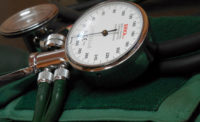A Hard Day’s Night
Training provides nurses with strategies for shift work and long work hours
A NIOSH Science Blog post
By Claire Caruso, PhD, RN, FAAN
“The problem for me became very severe and my head nurse actually called me into her office to discuss it… it had gotten to the point where I was so chronically sleep-deprived that I was falling asleep while I was trying to report off to the on-coming shift. So, I’m sitting there talking about very complicated medical issues, and in the middle of a sentence, I would nod-off. And as you can imagine, the person I’m speaking to would be very upset that I’m so distracted and unfocused…”
- Quote from a night shift nurse
People get sick and injured at all hours of the day. These injuries and illnesses are not restricted to a typical 9-5 work shift. In the U.S., healthcare services are available 24 hours a day 7 days a week. To meet this demand, nurses work in shifts–often 8-12 hours at a time–which may require them to work at night during traditional sleeping hours. Research has shown that shift work and long work hours are associated with: declines in functioning of the brain (thinking, remembering, etc.); reduced job performance, accidents, and errors; negative impact on health behaviors (obesity, smoking, etc.); increased short-term and long-term health risks; and negative impacts to patients, families, employers, and the community.
The symptoms of sleep deprivation are similar to alcohol intoxication. Research show that performance after being awake for 17 hours is similar to having a blood alcohol concentration (BAC) of 0.05% and being awake for 24 hours is similar to having a BAC of 0.10%. Note that the United States defines legal intoxication for purposes of driving as a BAC of 0.08% or greater. However, driving impairments are seen at a BAC of 0.05%, and some countries use a cutoff of 0.05% or lower for driving purposes.
The National Institute for Occupational Safety and Health (NIOSH) released a free online course to train nurses and their managers on the risks of shift work and long work hours, and strategies to reduce these risks. The training course was developed in collaboration with healthcare stakeholders, including nursing organizations and academic groups and will provide continuing education certificates for registered nurses who complete the course. A certificate of completion is available for persons who are not registered nurses.
The NIOSH Training for Nurses on Shift Work and Long Work Hours is designed to increase knowledge and promote better personal behaviors and workplace systems to reduce the risks linked to working shift work, long work hours, and exposure to related issues from insufficient sleep. Content is derived from scientific literature on shift work, long work hours, sleep, and circadian rhythms.
The training will inform nurses and their managers about the following: (click here to read the entire blog post)
Looking for a reprint of this article?
From high-res PDFs to custom plaques, order your copy today!








